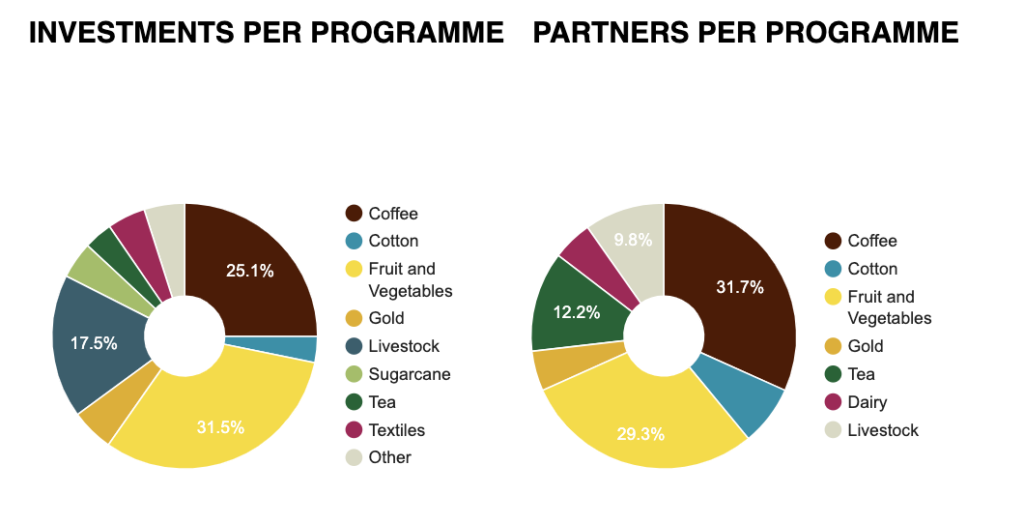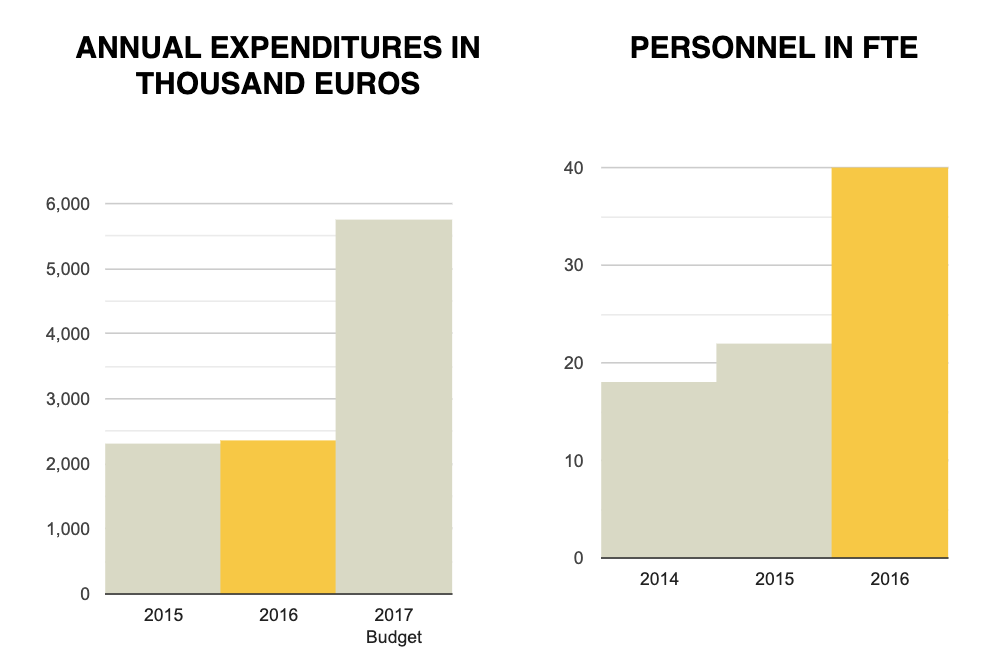REGIONAL COMMODITY PROGRAMMES
The East Africa Fairtrade and Ethical Trade programme strengthened the capacity of producer organizations, cooperatives and extension services for implementing sustainable practices among their members. The Food Security programme in Ethiopia & Kenya managed to improve the performance of stakeholders in agro-nutrition, food crop production and livestock production. The Coffee Partnership for Tanzania concluded with promising impact numbers over the past four years by increasing productivity and quality.

After a recent increase in textile production in Ethiopia, the local demand for lint cotton rose significantly. These developments in the country have changed the dynamics and trends of production and consumption, from lint exporter to exporter of finished products. The government of Ethiopia is developing a 15-year National Cotton Development Strategy. Solidaridad played, and will continue playing, a significant role in the roadmap and strategy development.

In several African countries, food security programmes were implemented to improve production and supply chains for local markets. Food safety is an important aspect in this context to avoid contaminated food from being consumed. International alignment has been sought in order to improve the efficiency so that standards for national markets are accepted in other African markets as well.

The first mine in Africa to reach Fairtrade certification, Syanyonja Artisan Miners’ Alliance (SAMA) in Uganda, was a partner of a Solidaridad partnership with Fairtrade Foundation in East Africa.

The sugarcane programme funded by DGIS was implemented in Tanzania in the Kilombero basin for the past three years. The programme covered capacity building for 8,000 farmers in 18 outgrower associations. The block farming pilot on 100 hectares received overwhelming support from both farming community and partners. The model is focused on reducing land fragmentation, increasing mechanization potential and improving productivity.

olidaridad’s work on climate-smart agriculture continued on building the capacity of farmers and staff of three factories, as well as training 82 promoter farmers and 136 agronomists who in turn reached 1,000 farmers. A massive tree planting programme (83,000 indigenous tree seedlings) was undertaken to improve biodiversity in the catchment areas of the factories. A total of 30 agronomists from smallholder and tea estate factories in Uganda were trained on tea husbandry, covering both theory and field practices.

Solidaridad’s interventions for textile in this region have concentrated in Ethiopia, which is one of the fastest emerging economies in Africa and is evolving as a potential textile and apparel sourcing destination. Solidaridad is confident that growth of this industry has the potential to contribute to poverty alleviation, create jobs under good working conditions and provide livelihood opportunities for hundreds of thousands of people in the coming decade, particularly women.

DEVELOPMENTS
East and central Africa economies are competing to attract the abundant concessionary loans from China and they have literally adopted a “look east economic policy”. Government expenditures on infrastructure have increased, which has led to a revival of manufacturing and services sectors by the private development players.
However, the increased loans are also related to corruption witnessed and recorded in most of these countries. Political upheavals and agitations across the region make corruption a top issue that needs to be addressed. During 2016, Ethiopia, Tanzania and Uganda held elections with varying degrees of unrest. These events affected implementation of Solidaridad’s programmes across the region. In fact, the implementation of programmes in Kenya is being hastened in anticipation of the elections to be held in 2017.
On the other hand, the population is increasing across the region which currently holds more than 140 million people. There is an emerging middle-class that has triggered demand for quality products. This demand has attracted private sector players, among them international supermarket chains and brands. The philosophy of speed and scale anchored across all of Solidaridad’s commodity supply chain programmes in the region will begin to address this triggered demand in the near future contribute.

ACHIEVEMENTS
Involvement of women and men across all the projects expanded financial stability for both genders. For instance, the Women in Coffee project enabled women to own coffee bushes, become members of cooperative societies, operate bank accounts and elect their own to leadership positions within the cooperatives.
The women adopted new high yielding varieties of coffee and replaced the aging coffee trees. The productivity of coffee managed by women has increased in volumes and quality compared to the bushes managed by their husbands or other men. This lesson is currently applied in the Going for Gold project which intends to economically empower women. Engendering all projects in the region has become a cardinal principle for Solidaridad.
There is another vital lesson from the project supported by Ford Foundation that ended in 2016. It became clear that bacterial wilt affecting tomatoes did not respond to the pesticides. Based on this, Solidaridad developed a proposal aimed at producing wilt-resistant varieties of tomato through a grafting process. This proposal received funding from NWO-WOTRO and introduced Solidaridad to other partners, including the Makerere University and Enza Zaden, a Dutch-based seed multiplier.
Working with the private market players, especially in fruits and vegetable sector, effectively allowed Solidaridad to achieve its planned objectives. Solidaridad engaged Sulma Foods, Meru Greens and Nile Breweries as market up-takers. When the project supported by Ford Foundation ended, Sulma Foodscontinued to work with the same farmers and the up-taker currently plays a role in a multi-stakeholder platform organized and supported by Solidaridad.

PARTNERSHIPS
Solidaridad established partnerships with Nestle, Ecom, Coffee Research Institute, Comic Relief, Dutch Ministry of Foreign Affairs, Dutch Embassy, aBiTrust, RVO, NWO-Wotro, Ford Foundation, and AgriProfocus.
New partners include Makerere University and NWO-Wotro on a tomato value chain which is a successor project to the one supported by Ford Foundation.
Going forward, Solidaridad intends to approach the Ford Foundation for another level of partnership especially focused on supporting the multi-stakeholder platforms already created. Solidaridad currently participates in the horticulture multi-stakeholder platform hosted by AgriProfocus, as well as Landscapes for People, Food and Nature, a global landscape platform.
ORGANIZATION
Due to the expansion of programmes in Kenya in 2016, Solidaridad recruited a programme manager for horticulture to replace a former manager who left the organization. The Food for All project was launched and an additional four field extensionists were brought on board. A finance officer and PME manager for the region also joined Solidaridad.
In Tanzania, a new satellite office was set up in Geita, the gold mining town. An engineer was employed as a project officer. Other staff were recruited in Uganda and Ethiopia offices to steer the food security and textiles projects respectively.
The total number of staff employed at Solidaridad East & Central Africa in 2016 was 20.
